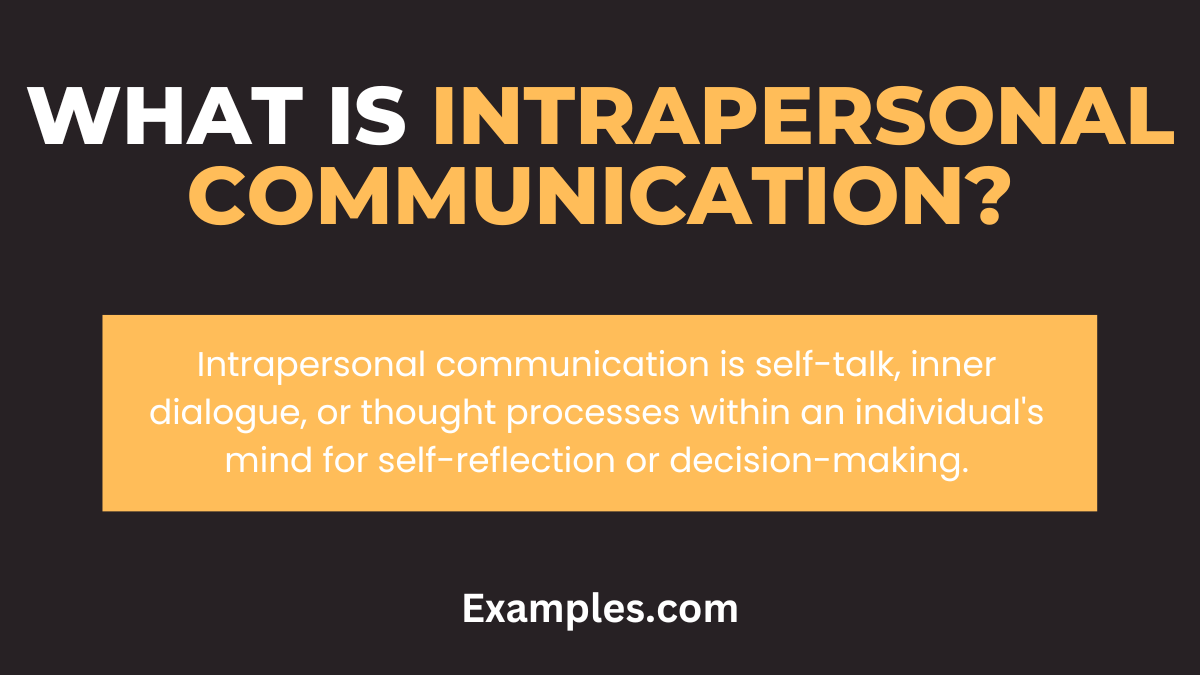What is Intrapersonal Communication?
In the realm of self-awareness and personal growth, ‘Intrapersonal Communication’ plays a pivotal role. This comprehensive guide provides a thorough understanding of its definition and meaning, enriching you with the knowledge of how to effectively engage in this form of communication. We explore various aspects of intrapersonal communication, offering practical examples and tips to enhance your internal dialogue. Whether for personal reflection, goal setting, or emotional processing, mastering intrapersonal communication is a key step towards personal development and success.
What is Intrapersonal Communication? – Definition

Intrapersonal Communication is the process of communicating with oneself. It involves thoughts, internal dialogues, self-talk, and personal reflections. This type of communication is all about how you understand and process information within yourself. It includes the way you motivate yourself, how you analyze your own behavior and decisions, and how you work through your feelings and thoughts. Intrapersonal communication is crucial for self-awareness, personal development, problem-solving, and decision-making. It’s the internal conversation that guides your actions and reactions in daily life.
Examples of Intrapersonal Communication
Intrapersonal communication involves the dialogue that happens within an individual. Here are some examples:
- Self-Talk: Engaging in an internal conversation with yourself, such as mentally rehearsing what you’re going to say in an important meeting or self-encouragement like, “I can do this.”
- Reflecting on Experiences: Taking time to think about your day, contemplating how certain events made you feel, and considering what you learned from them.
- Analyzing and Solving Problems: Thinking through a problem, weighing the pros and cons of different solutions, and deciding on the best course of action.
- Setting Personal Goals: Setting goals for yourself, like aiming to improve a skill or achieve a career milestone, and planning the steps you need to take to reach these goals.
- Daydreaming: Letting your mind wander to imagine future scenarios, like picturing yourself in your dream job or visualizing a successful outcome of a project.
- Internal Conflict Resolution: Debating with yourself over decisions, such as whether to make a significant career change or confront a friend over a disagreement.
- Emotional Regulation: Recognizing your emotions, like feeling anxious before a presentation, and telling yourself calming thoughts or using breathing techniques to manage those feelings.
- Evaluating Feedback: After receiving feedback, internally assessing its validity, considering how to implement it, and determining what changes to make.
- Personal Reflection: Spending time in introspection, examining your beliefs, values, and attitudes, and considering how they shape your actions and reactions.
- Mental Rehearsal: Visualizing yourself performing a task successfully, such as giving a speech or playing a sport, to prepare mentally for the actual event.
Intrapersonal Communication Skills
Intrapersonal communication skills involve self-talk, reflection, and emotional intelligence. They help in understanding personal thoughts and feelings, setting goals, making decisions, and managing emotions effectively, which are essential for personal growth and mental well-being.
Intrapersonal Communication Theories
Intrapersonal Communication Theories, such as Vygotsky’s inner speech concept, explore the psychological aspects of internal communication. They examine how self-talk influences cognition, perception, and behavior, providing a framework for understanding the internal processes of the mind.
- Looking Glass theory
- Johari Window Model
- Self-Discrepancy Theory
- Maslow’s Hierarchy of Needs
- Social Penetration Theory
- Transactional Analysis
- Cognitive Dissonance Theory
- Schutz’s Interpersonal Needs Theory
Elements of Intrapersonal Communication
Key elements of Intrapersonal Communication include self-awareness, internal dialogue, personal reflection, and emotional processing. These components help individuals analyze their thoughts and feelings, leading to better self-understanding and decision-making.
Importance of Intrapersonal Communication
Importance of Intrapersonal communication is crucial for self-awareness, emotional regulation, goal setting, and problem-solving. It forms the foundation for interpersonal communication and is vital for personal and professional development.
Intrapersonal Communication Activities
Intrapersonal Communication Activities like journaling, meditation, and mindfulness practices enhance intrapersonal communication. They provide opportunities for introspection, helping individuals understand and articulate their inner experiences.
Intrapersonal Communication Concepts
Intrapersonal Communication Concepts involves concepts like self-concept, self-esteem, and self-perception, which are integral to how one communicates with oneself. These concepts shape internal dialogues and influence behavior and reactions in various situations.
Types of Intrapersonal Communication
Types of Intrapersonal Communication include self-talk, daydreaming, and internal decision-making processes. Each type plays a role in how individuals process information, solve problems, and understand their emotions and motivations.
Intrapersonal Communication in Everyday Life
In daily life, intrapersonal communication manifests as self-reflection, decision-making, and managing emotions. It’s crucial in navigating life’s challenges and maintaining mental health.
Intrapersonal Communication in the Workplace
Intrapersonal Communication in the Workplace, it involves self-assessment, goal setting, and coping with stress. Effective intrapersonal communication is key to professional development, resilience, and job satisfaction.
Intrapersonal Communication in Nursing
For nurses, intrapersonal communication is vital in managing stress, reflecting on personal biases, and maintaining empathy. It helps in providing patient-centered care and in professional development within the healthcare setting.
Intrapersonal Communication in Business
Intrapersonal Communication in Business, it aids in leadership development, decision-making, and handling workplace challenges. Leaders with strong intrapersonal skills are better equipped to navigate complex business environments.
Characteristics of Intrapersonal Communication
Characteristics include being internal, continuous, and reflective. It involves thinking, analyzing, and interpreting one’s experiences. This form of communication is personal and subjective, influenced by individual perceptions and beliefs.
Intrapersonal Communication is a fundamental aspect of understanding oneself and navigating life’s challenges. This guide illuminates its importance, offering practical examples and tips for enhancing self-dialogue. By cultivating strong intrapersonal communication skills, individuals can improve self-awareness, decision-making, and emotional intelligence, essential for personal growth and effective interpersonal interactions.



